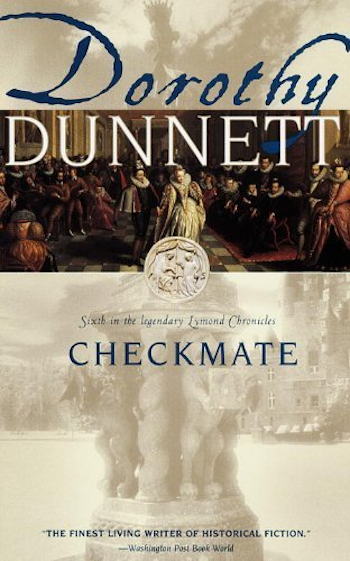He was not to know, his strung-up nerves doctored with alcohol, that disaster upon glorious disaster was about to befall the City of Paris’s Antique Triumph for the Heroes of Calais; or to guess what was to follow it. He had no premonition even when the curving line of royal carriages drew up on the gentle riverside slope of the Grève and rested there closed in the downpour while the City Fathers waited civilly ranked, their plumes and satins and erminetails buffeted like furzy wrack in the cataract.
In time, the rainstorm abated. The City Fathers stood, water running down their humble features. The King’s carriage door opened. The King’s steps were placed before it. The King emerged and placed his foot, smiling, upon them. The Town Battery embarked on an offering of deafening salvoes. The King’s carriage horses reared, and the King fell out on to the paving.
Lymond buried his face in his hands.
* * *
The guns were still firing as the Royal family, the Princes of the Blood, the victors of Calais and their ladies moved within the pictured arcade erected about the Hôtel de Ville portals. The Town’s fifty standing hackbuts also began their salute, followed almost immediately with a carillon of bells from the church of St. Jean en Grève, another from the belltower of St. Esprit and a third, a little behindhand, from St. Jacques de la Boucherie, whose tenor rope had broken.
A small concert of fifes, trumpets, clarions and tambours struck up inside the arcade (Hoc Hercule Dignae and cardboard marble) where the Prévôt des Marchands, his mouth opening and shutting, delivered his message of welcome. The King, his mouth also opening and shutting, could be seen to be persevering with an affable reply. Philippa’s husband, crimson with suppressed laughter beside her, was discovered to be talking also.
“What?” Philippa screamed.
“I said,” shrieked the noble and puissant seigneur François, comte de Sevigny, “thank God the guns are pointing…”
Silence fell.
“…away from us.”
He had dropped his voice in time, but Marshal Strozzi, also unfortunately commenting just behind, had not. There was an explosion of laughter, abruptly cut off. With her husband, very slightly out of hand, walking beside her Philippa followed the others up the staircase between the breathing ranks of Archers, Arbalestriers and Hackbutters of the Town and past Vicissitude, France In Triumph, the royal arms, the town arms and the motto, GRADATIM, or gradually repeated above every third step of an almost imperceptible progress into the Grand’ Salle of the Hôtel de Ville de Paris.
They had done their best, with tapestries, with paintings, with fleurs-de-lis and ships on the rafters, to create an Antique Triumph fit for the monarch. Pinned with ivy, painted on friezes were the escutcheons and the devices of everyone: the crescent of the King, the iris of the Queen, the Eclipse of Monsieur, the Gorgon of the King’s sister, the thistle of the Queen of Scotland, its purple still faintly running; the emblem, chastely sportive, of Madame de Valentinois, the King’s permanent mistress.
Happy fancies abounded. Along each tapestried wall hung ten twinned ivy crescents tied with taffeta: a reminder, had the Cardinals needed one, of the long and useful alliance between the Turkish and Christian kingdoms. At the service end of the room a Latin inscription, big enough to be read by the king and commencing SCOTIA TUTA SUIS, ACCEPTA BOLONIA…extolled the present reign’s finest successes. At the royal end hung the choicest offering: a rose-decked goddess with Bacchus and Satyrs and a verse beginning TU DEA. BACCHUS, AMOR…and ending, PRAELIA MNEMOSYNE, NON POCULA REGIA CURET, or, Count only the battles and not the cups the king drinks.
The names of the Duke de Guise, of Calais, of Guînes were everywhere, interwoven with heroic parallels: Jason; Ganymede; the banner of Caesar with four V’s instead of one, signifying that M. de Guise, having come, seen and conquered at last, should this time trap his good fortune by chains in case, as ever, it dodged him. The town had worked very hard.
On the other hand, although twenty years had passed since the Prévôt and Echevins, armed with silver trowels, had laid the foundation stone of the new Hôtel de Ville, it stood still only two storeys high, and its Grand’ Salle did not allow any elbow room when its tables were set for a hundred. Those invited by the Prévôt to watch, already admitted, lined the walls of the room on a scaffolding. Those invited by the Prévôt to sup, in their best clothes and early, naturally made sure of their places also.
The King entered, the trumpets blew, the bells rang out afresh from the churches, and the twenty-six merchants’ wives already ensconced at the High Board rose, curtseyed and settled again, smiling at their less privileged friends. It was clear where the King was to go, since the royal chairs had been placed on a dais. Where the princes of the blood, the victors of Calais and the great lords of the court were to be seated was for fifteen minutes a matter of frenzy.
Steering purposefully, Philippa found two vacated places just below the Sieur d’Andelot, the Duke de Nevers and Seigneur d’Estrée for the former Voevoda of Russia and King’s Lieutenant-General in Paris, who was showing a maddening preference for simply standing stock-still, looking virtuous.
Unfortunately, Piero Strozzi elected to come and sit on her other side. He caught Lymond’s eye, which was not hard to do. Philippa Somerville turned to the Marshal and addressed him in succinct Italian. “If you laugh, I shall kick you.”
“Signora,” said Piero Strozzi, “if you care to continue in this field of discussion after dinner, we should have much to say to one another. That is——”
He broke off, his eye arrested by something on her other side, and then resumed, injured, “…that is, if you had not brought your Russian retinue with you. In bocca serrata mai non entrò mosca. I give you a friendly warning. You think M. de Sevigny is drunk. He is not.”
“You might not think so,” said Lymond amiably. “But in ten minutes or so, I am going to slip under the table and lie there.” On his other side, the comtesse de Laval put her hands over her ears and pulled a face at him. The noise, ringing back from the beams, was quite dizzying, and so were the fumes of sweat and scent and wet clothes and incoming food. The doors, which had been with difficulty shut, burst open again to admit a group of noisy, wet people. They closed, and then opened again. There were not enough places at the table. The benches jostled with incomers. The narrow space between the long trestles was filled with parties looking for seats, parties standing or kneeling on seats or parties simply meeting other parties and exchanging various witty ripostes.
They were all, Philippa saw, minor members of the Court, who had had no invitations in the first place. Perrot, speaking to the King, looked extremely flustered. The Maître d’Hôtel was sweating. More people began to pour in. The superfluity of blue blood, it was clear, was more than thirty Archers without benefit of password knew how to control. The reeking air, pushed by the heat from the two raging fires, moved and swung and swirled up to the rafters where the municipal chandeliers, specially made in black and white, the King’s colours, tossed and swayed from their herbaceous pinnings.
The comte de Sevigny looked up, his hair, and the priceless collar he wore neat and spiteful and glittering in the candlelight. “Christ,” he said. “Piero. What are you going to do when the candelabra fall down?”
Piero Strozzi leaped to his feet. “Messeigneurs!” The roar of it cut across even that febrile cacophony. “Messeigneurs nearest the door! The candelabra are about to fall on you!”
That got rid of twenty-five people. By a miracle of sinuous movement, Lymond was by the outer doors as the last of them backed out, exclaiming. The outer doors shut, then the inner doors. Marshal Strozzi, leaping to his feet, roared, “Messeigneurs! All has been made safe! The Prévôt begs you all to sit and be welcome!”
Everyone subsided. Opposite her, Philippa noticed, she had the god Janus with a key in his hand, and a verse beginning QUI BIFRONS FUERAM, GALLIS SUM GALLICUS UNA FRONTE DEUS, indicating, she took it, that he was prepared to be two-faced for everyone except Frenchmen. It reminded her of something. Lymond, sliding back, said, “I’ve told Jacob if his Archers let another soul in, I’ll shout Fire. They’ll all jump through the windows.” A braying noise, creeping into the room while he was speaking, broadened, intensified, and began to permeate the clangorous gases.
Strozzi screamed. Lymond, not in the least disturbed, frowned at him. “I asked the hautboys and clarions to play for us. Paris, fontaine de toutes sciences. If you can’t lay your hands on three hundred Tartar horsemen with scimitars, I recommend clarions for quelling a riot. What, then?”
Piero Strozzi had screamed again. The Queen’s cousin rose to his feet. Below the black hair, tightly curled with the damp, his lips were drawn back in a rictus of passion, displaying his broken teeth. Then, raising one pink and ribboned arm, he swept it across the table and tore from a startled échevin’s grasp the silver cup from which he was drinking. Gouts of claret soaked the municipal rust and crimson velvet. The merchant jumped to his feet.
Nose to nose: “You have many ill-deserved rights as échevin of this undesirable city,” said Piero Strozzi, “but stealing my table silver is not one of them!”
Someone hauled, with steady violence, at his coat. He rocked, but remained standing.
“Monseigneur!” Where visible through beard and winestains, the merchant’s face was blotched with fury. “I demand reparation! You insult me and the city which honours you!”
“Honours me!” roared Marshal Strozzi, staggering and recovering with aplomb. He interrupted himself, staring along the crowded table. “Mon petit François, there is your silver, also.”
“So it is,” said Lymond with interest. The merchant’s wife who was admiring a great salt in cut glass and silver snatched her hands back, turning white. The man at her side began to rise slowly, piping like a Chinese ocarina. Lymond, concentrating, surveyed him closely. “Now I think of it, the shirt is very familiar.”
“My lord count!” said the Councillor.
“…But I couldn’t swear to it, in a court of law. I don’t object. The intention is to make us feel at home.” He lifted a heavy silver-gilt object from the table far to his left and showed it helpfully to Marshal Strozzi. “There’s one of your livery pots.” Marshal Strozzi lunged.
This time Philippa waited until he was off-balance. Then she took a strong grasp of his fur-trimmed coat with both hands and jerked.
With a crash and a hooting of oaths which out-trumpeted even the clarion, Marshal Strozzi fell on his back. It was a gradual fall, broken by the short row of pages behind him. He dropped into a dish of roast swan, and from there into a platter of bustards, and ended with a liquid sigh on the floor in a bowl of small pullets with vinegar. Gilded plumes from the swan quilled, with chic, a bubbling tippet of gravy. From the ruffled merchants, there came a squeal of shocked glee. He lay, speechless.
Across his fallen chair, Lymond gazed reflectively at his wife. “You borrowed the silver,” he said.
“Someone had to help them,” said Philippa. “The King invited himself, and left them eight days to get ready. Baptiste had four days to finish the paintings. The tinsmith could only supply so much on short notice. They had to have linen brought in and laundered and buy rose water to scent it, and torch batons and wine, and get a Folder of Linen for the napkins. The master roasters and bakers haven’t had any sleep for three days, and Jodelle for four, and they’ve all been here since this morning, slaving to make everything ready.”
Piero Strozzi sat up, his gravy-stained hands negligently clasped about his steaming and redolent knees. “But why the comtesse de Sevigny?” he inquired. He was no longer annoyed.
Philippa glanced at Lymond. “The comte de Sevigny had protected the walls of their city. They were willing to entrust me with their pride.”
“Ah.” Piero Strozzi rose to his feet, righted his chair and removing his ruined coat, seated himself in his doublet. “I think, mon petit François, that your wife delivers a reprimand and a warning. We watch our conduct?”
“It’s going to be awful,” Philippa said, flinching as the King’s trumpets, shrieking, announced the general serving of the banquet. “But if your bone-headed scions make fools of them, the Prévôt and Councillors will never forgive them.”
Piero Strozzi and Francis Crawford looked at one another. “A hint,” said Lymond, “sufficeth for the wise, but a thousand speeches profit not the heedless. Did you hear what she said?”
“Unfortunately,” said Piero Strozzi, “I heard what she said. She spoke good sense.”
“No bloodshed, harrows and ffrayes?”
“I have said this before,” said Piero Strozzi austerely. “You have no sense of responsibility. Look at those titled louts at the end of the table who will not sit because they have not been brought wine. Do they not realize that pages cannot pass between the tables if they move about and meet their friends and slap one another, laughing?”
“We have wine?” said Lymond.
“Yes. And some of us have had too much of it. Let us pass it,” said Piero Strozzi, picking up two of the willow-covered flasks standing before him, “to those more deserving.”
The two bottles sailed through the air. Pursued by three other pairs they made their way, hurtling, from one end of the table to the other. As it happened, there were no mishaps. The young men clambering over the end of the table desisted for the nonce and sat down. A dam of steaming dishes, thus released, proceeded like a millrace down the room and then halted again, blocked by a hilarious group. “Why,” said the comtesse de Laval on Lymond’s other side, “are the pages four feet high? They cannot see where they are going.”
“And yellow and violet silk!” said Piero Strozzi. “It martyrs the eye even more than your vulgar collar, mon fils.”
“They’re children. Whose?” said Lymond sharply.
“The merchants’ sons,” said Philippa. The Marshal had been right. He was sober. “The children are serving everywhere except the royal table, to honour the King and allow them a share of the celebration. But of course, they’re frightened. And the crowd won’t let them through.”
“They will,” said Lymond briefly.
She caught his arm, and then dropped her hand instantly, her colour heightened. “No. You can’t control it for them.”
“No,” he agreed after a moment. He dropped back into his seat. “But I can dispatch some very dirty stares. Piero?”
“I heard you,” said Piero. “You have become responsible. No te quiero. No te quiero, Juliano.”
“You will,” Lymond said, “when the Paris Parlement votes us all that beautiful money to enable you to squeeze more victory prizes out of the poor bleeding treasury of France. If you will control that little bastard Paliano at your end, I shall petrify the equerries by the fireplace at mine. Oh Christ, he’s going to spill jelly all over us.” He switched to French. “I see, mon cher, you carry this as the King’s pages do. I know a better way. Hold it thus, and thus. You see? And smile. The King likes smiling faces.”
Piero Strozzi closed his mouth, which had fallen ajar. “Of course,” he said. “You have a son, don’t…”
He roared. “I beg your pardon. My foot slipped,” said Philippa. “Have a date flan, and don’t talk so much while the hautboys are playing. If you lose your voice, none of us will know what to do.”
In fact, they did their best to salvage the occasion. The Sieur d’Estrée and the d’Andelots helped. But disaster, like a dropped stitch in knitwear spread running and, torn between sympathy and hysteria, Philippa was forced to watch the evening steadily and formidably falling apart.
Children were sick, burst into tears and dropped dishes. All the marzipan arrived at one table and all the cream dariolles at another. The trestle nearest the serving door captured all the Auxerre wine as it came through and refused to let the serving children carry it further.
The tables further from the serving door began throwing dragees in protest, followed by harder objects: Piero Strozzi at this point collected his own silverware and the Sevigny crystal and put it under his bench, which led to a good deal of excitement from the deprived diners who had to drink out of the wine flasks, share cups or pour wine on their platters and lap it, which some of them unhappily did.
A brief moment of uneasy silence fell during the saying of grace by the Cardinal, and another was accorded the eulogy to the Duke de Guise by the Prévôt des Marchands.
There followed a modest reply by the Duke, the hero of Calais himself, dressed, as Lymond had predicted, in white and gold velvet and diamonds. He made courteous reference, in the course of it, to the able support of his many brave captains and applause broke out all round the tables where Philippa and her companions were sitting.
When the Lieutenant-General had resumed speaking: “Chacun son tour,” said Piero Strozzi under his breath. “You know why M. de Guise kept none of the booty from Calais? A million pounds in gold, he gave to his captains, and fifty thousand livres’ worth of English fleeces to d’Andelot alone—the painting of Jason there, mon fils, should bear a Coligny face. Monseigneur required a military success and a popular success both, and you and I gave it to him. O, God in heaven: we are to suffer a fanfare?”
The speech had ended, and the comte de Sevigny’s antiseptic blue gaze was turned on his garrulous companion. “He’s going to recite,” Philippa said.
Lymond recited. It was, happily, something she could help him with.
“His prayses with the princely noyse—”
“—Of sounding trumpets blow”:
“Prayse hym upon the viole, and—”
“—Upon the harpe also.”
“Prayse him with Timbrel and with Flute—”
“—Organnes and Virginalles,”
“With sounding Cymbals prayse ye hym—”
“—Prayse hym with loude Cymbals.”
“—There are times when I feel,” Philippa said, “that one set of cymbals would be sufficient.”
“But the Duke de Guise,” Lymond said, “is happy with two sets of cymbals, and quand le bâtiment va, tout va…Philippa, Philippa, what have you been hiding from us? A plague of demons is attempting to enter the room, a sword of fire out of the gullet of each of them, and every one of them as high as the clouds of heaven. The City Fathers have commissioned a Spectacle?”
“Oh dear!” said Philippa, groaning. “The City Fathers have commissioned two entertainments from Jodelle. But they should have drawn the boards first.”
“They should certainly have drawn the boards first,” Lymond concurred. “They’re going to act in and out of the King’s jacket buttons….Oh, Christ. Orpheus?”
“Orpheus,” agreed Philippa sorrowfully. Fighting his way through the crowd, his laurel wreath knocked quite a little askew, trod a singular figure with a carmine smile, a paunch and a lyre. From the shifting shape of his mouth, but from nothing else, one could tell he was singing.
The court, being accustomed to mime, made no concessions. The volume of greeting, conversation and comment rose, intensified and thundered back on itself, carrying Orpheus into masterful inaudibility. A pasteboard belfry jammed in the doorway, tripped, and entered on six dirty feet. A second one followed.
“Francis…” said Piero Strozzi.
“Be quiet,” said Lymond. “I’m lip-reading. Chantés rochers, et avecq’ vostre Orphee, Adorés moy d’un grand Roy le Trophee. Rochers?”
“Chlochers,” Philippa said. “They ordered rocks and got belfries. Bad handwriting.”
“Hell’s own bells too, if I may say so,” said Lymond.
“Rocks with Sirens in them,” Philippa corrected him patiently. “You’re very slow. It’s Jason and the Argonauts.”
“No one’s handwriting could be that bad,” said Lymond. The Sirens, quavering, retrieved their meandering minims, breathed, and arrived in scratchy unison at their ultimate lines.
O trois trois fois trois fois heureus Orphee
O trois trois fois trois fois heureus Trophee.
A yap of hysteria rose from the audience. “Francis,” said Piero Strozzi. “Mon petit François; Madame; I have done my best to help make of this historic Triumph an event which Messieurs of the Ville will relate to their grandsons. I have tried. You have tried. But nothing, mort-Dieu, can redeem this bella cagata. I, Hesychast,” said Piero Strozzi, “am going to lie on the floor and—forgive me—study my belly-button.”
And he did, gracefully, accompanied by the claret flask. Philippa Somerville looked up at Lymond, who had risen and was concentrating visibly on the players.
“Well?” said Philippa kindly.
He turned his head slowly and stared at her. “Minerva in a canvas shirt of mail and a helm with a cock on the top. There’s a gorgon’s head on her shield.”
“Oh.”
“She has quite a short ginger beard. She’s forgotten her lines. In any case, she can’t hear the prompt.”
“That must be awkward for her,” Philippa said.
“Yes. There she goes. You should listen. How about that?
“…Me suis de ton Paris faite la gardienne
Par ton Pere, qui seul me rend Parisienne…”
“And now,” continued the architect of the battle of Calais, his voice somewhat stifled, “there is a very large ship attempting to walk through the doorway.”
“Argo,” said Philippa. “I told you.”
“And you recall those little budge wigs made of lambskin…? Could it be Jason?” said Lymond. “In leopard fur, kicking the belfries in their white satin slops? It’s not their fault. They can’t see where the door is. But they’ve got the ship through. They’re trying to put up the mast. And who’s that?”
Philippa craned. “That’s Mopsus, the Argonauts’ soothsayer. He was killed by the bite of a serpent.”
“Not this one. This one,” said Lymond, “is going to be hanged like Mumphazard for saying nothing. You know how Jason died?”
“Naturally,” said Philippa, severely. “A beam from the ship fell on his…Oh, dear.”
“Philippa,” said Lymond weakly against the rising gale of anguish and laughter, “I do beg your pardon, but if I am to attend court again, I shall have to retire under the table with Piero. Gradatim.”
He gazed owlishly at her and she, her eyes brimming, stared back at him. Acutely as she felt for the échevins’ suffering, there was a limit to one’s powers of civil endurance.
They exploded together, and Lymond slid, as he had threatened, under the table to lie silently shrieking beside the reclining figure of the Queen’s favourite cousin while Philippa, covering her face with her hands, sat helplessly through the heroic dregs of the Antique Triumph of Calais.














